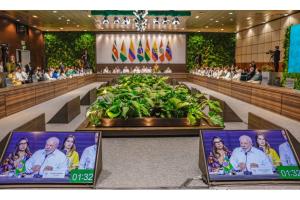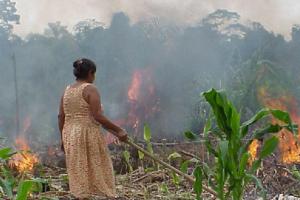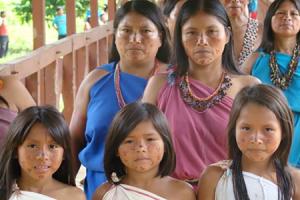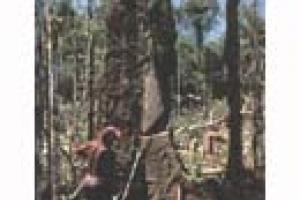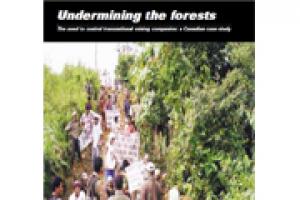Using the argument of “sustainable development”, governments in the Amazon region continue providing incentives for extractivism. In the face of this, indigenous leader Alessandra Munduruku vents her thoughts: “What we need is the demarcation of indigenous territories. Enough talk of bioeconomy, of sustainability, when there is violence in the here and now.”
Guyana
Bulletin articles
27 February 2024
The Amazon Summit: Extractivism and violence in the name of the “bioeconomy” and of “sustainability”
Bulletin articles
9 July 2018
Fires in the Amazon are occurring more frequently and with greater intensity. But who is really burning the forests?
Bulletin articles
7 July 2017
How to make the sustainability of life the center of debate
Bulletin articles
7 April 2006
A new FSC certificate of a major logging operation has again raised eyebrows among foresters, environmentalists and human rights activists. In Guyana, the Swiss certification company SGS Qualifor has just granted an FSC certificate to the Malaysian-Korean logging giant, Barama Company Limited (BCL), which operates a 1.69 million hectare concession in North West Guyana.
Bulletin articles
3 December 2002
The Amerindian Peoples Association (APA) has expressed deep concern about the Memorandum of Understanding (MOU) to establish Southern Guyana as a protected area, saying it was "gross disrespect" to local tribes.
Bulletin articles
7 September 2002
Despite decades of lobbying successive governments for full legal recognition of their traditional land rights, the 55-60,000 Amerindians in Guyana still find themselves in one of the most precarious land tenure situations in South America: many communities lack any legal land title whatsoever, while the others can only count on an insecure title which covers just a fraction of their ancestral territory, and which can be revoked unilaterally at any time by the Minister of Amerindian Affairs.
Other information
18 July 2002
Only available in Spanish
Publicación de Censat-Agua Viva en ocasión de la Cumbre Mundial de Johannesburgo.
Amazonía: Selva y Bosques diez años después de Río
Bulletin articles
13 February 2001
Inner land in Guyana consists of a 150 kilometre wide tropical rainforest, mostly untouched. However, the official perception since the ‘70s of mining as essential for “development”, and the opening of the country’s economy --with the subsequent promotion of the exploitation of natural resources, especially timber and minerals-- to face the increasing foreign debt and satisfy the conditions of the 1991 structural adjustment programme imposed by the IMF and the World Bank, have paved the way to transnational companies.
Bulletin articles
16 November 2000
Dr Conor Wilson Boyd --president of Weyerhaeuser Forestlands International, a company owning a total of 28 million acres of forest in North America and established in 32 countries-- made a presentation during a meeting organized by the Iwokrama International Rainforest Centre for Rainforest Conservation and Development last October in Georgetown.
Bulletin articles
18 June 2000
Following a recommendation of the Privatisation Unit's Board, the government of Guyana is considering a proposal under which Primegroup Limited and Matthews Associates would take over the Wauna Oil Palm Estate in the north west region of the country, on condition that they establish a local company. Primegroup Ltd. is a major investor in oil palm development in Malaysia, ranked as the first producer in the world.
Publications
16 January 2000
by Forest Peoples Programme, Philippine Indigenous Peoples Links and the World Rainforest Movement
